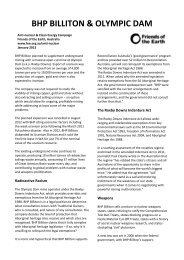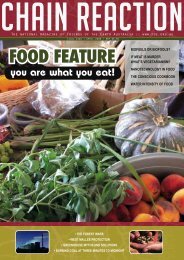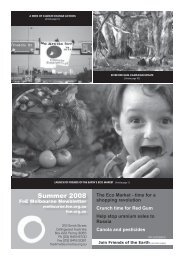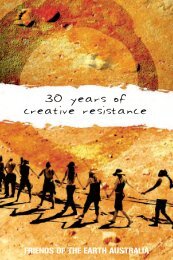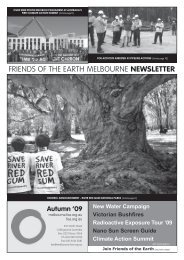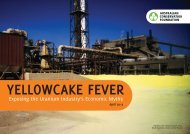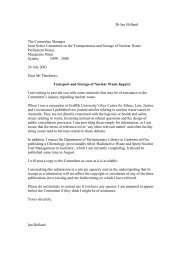Yellowcake Country? - Friends of the Earth Australia
Yellowcake Country? - Friends of the Earth Australia
Yellowcake Country? - Friends of the Earth Australia
Create successful ePaper yourself
Turn your PDF publications into a flip-book with our unique Google optimized e-Paper software.
Scientists silenced.<br />
In February 2006, ABC TV’s Four Corners<br />
aired allegations by a former Liberal Party<br />
staffer that powerful special interest groups<br />
controlled federal government environment<br />
policy. Guy Pearse said, “The access that<br />
<strong>the</strong> fossil fuel industry has enjoyed and<br />
<strong>the</strong>ir influence over greenhouse policy in<br />
<strong>Australia</strong> is extraordinary.”<br />
Fur<strong>the</strong>r investigations revealed that<br />
a group <strong>of</strong> 12 fossil fuel companies<br />
were hand-picked by <strong>the</strong> government<br />
to provide advice for <strong>the</strong> energy policy<br />
white paper, ‘Securing <strong>Australia</strong>’s Energy<br />
Future’, which recommended investing in<br />
geosequestration: burying CO2 after it has<br />
been produced.<br />
And former CSIRO scientist Mark<br />
Diesendorf says that CSIRO scientists are<br />
routinely prevented from speaking out<br />
on climate change issues if <strong>the</strong>ir findings<br />
contradict <strong>the</strong> federal government’s<br />
position.<br />
In The Canberra Times, Diesdend<strong>of</strong> said,<br />
“The producers and consumers <strong>of</strong> fossil<br />
fuels, and <strong>the</strong>ir supporters among public<br />
<strong>of</strong>ficials, <strong>the</strong> federal government and CSIRO,<br />
are well aware that we already have <strong>the</strong><br />
technologies to commence a rapid transition<br />
to an energy future based on renewable<br />
energy and efficient energy, with gas playing<br />
<strong>the</strong> role as an important transitional fuel.<br />
The barriers to this transition are not<br />
primarily technological or economic, but<br />
ra<strong>the</strong>r are <strong>the</strong> immense political power <strong>of</strong><br />
vested interests.”<br />
Standby<br />
for climate<br />
change.<br />
Did you know that <strong>Australia</strong>n<br />
households waste electricity by keeping<br />
appliances like TVs and DVD players on<br />
standby<br />
Do away with that remote! Try turning<br />
<strong>the</strong> TV <strong>of</strong>f at <strong>the</strong> set.<br />
accidents like Chernobyl remains; in turn,<br />
enormous government subsidies are needed<br />
to underwrite <strong>the</strong> financial risks to insurance<br />
companies.<br />
• The increased risk <strong>of</strong> nuclear weapons and<br />
nuclear terrorism means that embracing <strong>the</strong><br />
nuclear fuel cycle increases global insecurity.<br />
• Lastly, nuclear power produces radioactive<br />
waste. This waste will have to be stored safely<br />
for hundreds <strong>of</strong> thousands <strong>of</strong> years.<br />
So what should our strategy be<br />
By far <strong>the</strong> most cost-effective way to reduce<br />
our carbon emissions is to improve energy<br />
efficiency. All forms <strong>of</strong> new supply are more<br />
expensive than improving <strong>the</strong> energy efficiency<br />
<strong>of</strong> <strong>the</strong> services we want: cooking, washing,<br />
lighting, transport and so on. As Amory Lovins<br />
put it, people don’t want energy, <strong>the</strong>y want hot<br />
showers and cold beer.<br />
If your fridge or washing machine is more<br />
efficient, that is real money in your pocket<br />
as well as a win for <strong>the</strong> environment. If your<br />
house is better insulated, it costs less to heat<br />
in winter and you are less likely to turn on air<br />
conditioning in summer.<br />
Improving efficiency makes good business<br />
sense. The UK-based Climate Group’s 2005<br />
report ‘Carbon Down: Pr<strong>of</strong>its Up’, showed that<br />
43 companies had significantly reduced <strong>the</strong>ir<br />
greenhouse gas emissions, and saved a total <strong>of</strong><br />
$15 billion in <strong>the</strong> process.<br />
Renewables can meet <strong>Australia</strong>’s energy<br />
demands. Just 15 wind farms could supply<br />
enough power for half <strong>the</strong> homes in NSW. And<br />
that would only use less than half a per cent<br />
<strong>of</strong> <strong>the</strong> pasture land in <strong>the</strong> state — without<br />
disrupting grazing. Fitting solar panels to half<br />
<strong>the</strong> houses in <strong>Australia</strong> could supply seven<br />
per cent <strong>of</strong> all our electricity needs, including<br />
industry needs, enough for <strong>the</strong> whole <strong>of</strong><br />
Tasmania and <strong>the</strong> Nor<strong>the</strong>rn Territory.<br />
It’s a myth that when <strong>the</strong> wind stops or a<br />
cloud goes across <strong>the</strong> sun <strong>the</strong> system collapses!<br />
The strongest system is a grid that is fed by<br />
various forms <strong>of</strong> energy. A mix <strong>of</strong> renewable<br />
energies would provide <strong>the</strong> system with<br />
flexibility. Big centralised coal-powered systems<br />
require expensive backup in case <strong>the</strong> largest<br />
unit goes down. Diverse sources <strong>of</strong> energy<br />
make an energy system more reliable. In any<br />
case, no one is suggesting we switch from coaldependency<br />
to wind and solar quickly. In <strong>the</strong><br />
short-term gas will have an important place as<br />
we wean ourselves <strong>of</strong>f coal.<br />
Renewable energy works. Renewables now<br />
account for a quarter <strong>of</strong> <strong>the</strong> installed capacity<br />
<strong>of</strong> California, a third <strong>of</strong> Sweden’s energy, half<br />
<strong>of</strong> Norway’s and three-quarters <strong>of</strong> Iceland’s.<br />
Sweden expects to increase its use <strong>of</strong> wind and<br />
bioenergy so that, by 2010, 60 per cent <strong>of</strong> its<br />
electricity is from renewables.<br />
In China, <strong>the</strong> city <strong>of</strong> Beijing plans to build<br />
a solar street. The pilot project is part <strong>of</strong><br />
China’s commitment, by law, to use 10 per cent<br />
renewable energy by 2020, and its ambition to<br />
become <strong>the</strong> world’s leading producer <strong>of</strong> solar<br />
heat panels.<br />
I would like to see o<strong>the</strong>r states follow South<br />
<strong>Australia</strong>’s lead and outlaw <strong>the</strong> installation <strong>of</strong><br />
new electric water heating in favour <strong>of</strong> solar,<br />
heat pumps or gas. When an average household<br />
switches from electric to solar water heating,<br />
<strong>the</strong>y cut <strong>the</strong>ir household emissions by 20 per<br />
cent and save $300 a year.<br />
We should set a target <strong>of</strong> at least five per<br />
cent for bi<strong>of</strong>uels in <strong>the</strong> transport sector as<br />
well as requiring cars to be more efficient and<br />
investing properly in public transport.<br />
In summary, we should make a commitment<br />
to <strong>the</strong> sensible alternatives that produce<br />
sustainable cost-effective reductions in<br />
greenhouse pollution: wind power, solar water<br />
heating, energy efficiency, gas and energy from<br />
organic matter such as sewage and waste.<br />
To avoid dangerous fur<strong>the</strong>r changes to our<br />
climate, we need to act now.<br />
Pr<strong>of</strong>essor Ian Lowe AO is <strong>Australia</strong>n<br />
Conservation Foundation (ACF) president,<br />
co-patron <strong>of</strong> The Natural Edge Project, and an<br />
emeritus pr<strong>of</strong>essor in Science, Technology and<br />
Society at Griffith University.<br />
This is an edited version <strong>of</strong> Lowe’s National<br />
Press Club address, October 19 2005. The full<br />
speech is available at<br />
www.acfonline.org.au/news.aspnews_id=582<br />
Page 11



